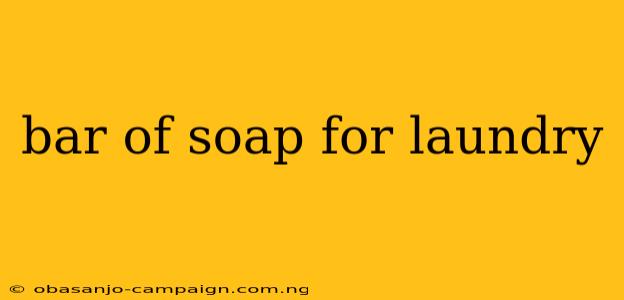The Allure of a Simple Wash: A Guide to Laundry Bar Soap
The humble bar of soap, a mainstay in kitchens and bathrooms for centuries, is experiencing a resurgence in popularity, particularly in the world of laundry. While many rely on liquid detergents, the allure of a simple, natural, and often cost-effective alternative is undeniable. This guide dives deep into the world of laundry bar soap, exploring its benefits, drawbacks, and everything you need to know before making the switch.
Understanding Laundry Bar Soap: Types and Ingredients
Laundry bar soap is essentially a concentrated soap made with ingredients designed to tackle dirt and grime on fabrics. You'll find a diverse range of options on the market, each with its own unique blend of ingredients, and a vast range of price points.
Common Types:
- Castile Soap: This type, made with 100% olive oil, is known for its gentle nature and effectiveness on delicate fabrics. It's often chosen for hand-washing garments.
- Plant-Based Soaps: These bars typically incorporate a combination of plant oils, like coconut oil, palm oil, and others. They're often favored for their powerful cleaning action and ability to tackle tough stains.
- Borax-Based Soaps: This type uses borax, a mineral salt, as a booster to enhance cleaning power. While effective, it's essential to use borax with caution as it can be harsh on some fabrics.
Essential Ingredients:
- Oils: The primary cleaning agent in most bar soaps. Coconut oil is commonly used for its strong cleaning power, while olive oil offers a gentler approach.
- Lye: This chemical is essential for saponification, the process of turning oils into soap. It's typically neutralized during production, ensuring a safe product.
- Additives: Various additives can be included in laundry bar soap. These can include essential oils for fragrance, natural dyes for color, or even additives like baking soda to increase cleaning power.
When to Choose Laundry Bar Soap: Advantages and Disadvantages
Choosing the right laundry detergent is a personal preference based on your needs and priorities. Laundry bar soap offers several advantages, making it a compelling option for many:
Advantages:
- Cost-Effectiveness: Bar soap often goes further than liquid detergents, potentially saving you money in the long run.
- Environmentally Friendly: Many bar soaps are made with natural ingredients and packaged in less wasteful ways than plastic containers.
- Gentle on Fabrics: Many bar soaps are less harsh than conventional detergents, making them ideal for delicate garments and sensitive skin.
- Travel-Friendly: Bar soap is compact, lightweight, and easy to pack for travel.
Disadvantages:
- Melting: Some bar soaps can melt quickly in a washing machine, leading to residue and cleaning issues.
- Scent Sensitivity: Some individuals may find the scent of certain bar soaps strong or overpowering.
- Washing Machine Compatibility: Some washing machines may not be ideal for using bar soap. It's important to consult your machine's manual for guidance.
How to Use Laundry Bar Soap: Tips and Tricks
While using bar soap for laundry is straightforward, there are tips and tricks for maximizing its effectiveness and minimizing any drawbacks:
Grate and Dissolve:
- For the best results, grate the bar soap into fine flakes using a cheese grater or soap grater.
- These flakes dissolve more easily in the washing machine, preventing clumps and ensuring thorough cleaning.
Washing Machine Compatibility:
- If you have a high-efficiency (HE) washing machine, using a laundry bar soap may not be ideal. HE machines use less water, which can make it challenging for the soap to dissolve completely.
- Consult your washing machine's manual for specific instructions regarding detergent use.
Pre-Treat Stains:
- For tough stains, you can make a paste by combining grated soap with a little water. Apply the paste to the stain and let it sit for a few minutes before washing.
Dosage:
- Start with a small amount of grated soap and gradually increase as needed.
- The ideal amount will vary based on the soap's strength, the load size, and the level of dirtiness.
- Avoid using too much, as it can leave a soapy residue on your clothes.
Choosing the Right Laundry Bar Soap: A Comprehensive Guide
Selecting the right laundry bar soap for your needs can be overwhelming given the sheer number of options available. Here's a breakdown of factors to consider:
- Type: Consider your laundry needs. Are you looking for a gentle soap for delicate fabrics, or a powerful one for tackling heavy stains?
- Ingredients: Examine the ingredient list. Look for natural and biodegradable options, and consider your sensitivity to any specific fragrances or additives.
- Price: Set a budget and compare prices across different brands and types. Remember that bar soaps can often be a more cost-effective option in the long run.
- Reviews: Read reviews and recommendations from other users to gain insights into different brands and their effectiveness.
The Future of Laundry: Embracing Simplicity
Laundry bar soap represents a return to simplicity and natural solutions in a world of increasingly complex and often chemically-laden detergents. As concerns grow about environmental impact and potential health risks associated with traditional detergents, the allure of a natural alternative like bar soap is undeniable. While not without its challenges, bar soap offers a sustainable and effective way to care for your clothes and our planet.
